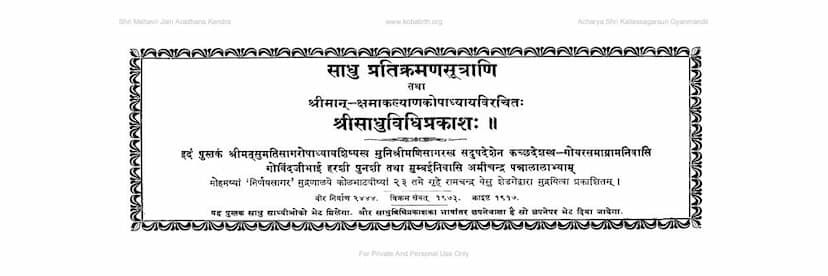Sadhu Pratikraman Sutrani Tatha Sadhu Vidhi Prakash
Added to library: September 2, 2025

Summary
The provided text is the Jain scripture "Sadhu Pratikraman Sutrani Tatha Sadhu Vidhi Prakash" authored by Kshamakalyan Upadhyay and published by Govindjibhai Harshi Punshi. The catalog link directs to a Jain repository.
This book is primarily a compilation of Jain Pratikraman Sutras (formulas for repentance and confession) specifically for ascetics (Sadhu and Sadhvi) and also includes the Sadhu Vidhi Prakash, a guide on the conduct and rules for ascetics.
Here's a breakdown of the content based on the provided pages:
Core Purpose:
- Spiritual Purification: The central theme is the purification of the soul through the practice of Pratikraman, which involves confessing and repenting for transgressions (aticharas) committed, both intentionally and unintentionally.
- Ascetic Conduct (Sadhu Vidhi): It outlines the expected behavior, duties, and adherence to vows for Jain monks and nuns.
- Vow Observance: It emphasizes the strict observance of the five great vows (Mahavratas) and other principles of Jainism.
Key Sections and Concepts Covered:
-
Opening Invocation (Page 3):
- Starts with the sacred Navkar Mantra (Namokar Mahamantra), which is a fundamental prayer in Jainism, acknowledging the supreme beings (Arihanta, Siddha, Acharya, Upadhyaya, Sadhu).
- Expresses the goal of overcoming sins and achieving auspiciousness.
-
Samayika and Pratikraman (Pages 3-4):
- Samayika: A period of equanimity and spiritual practice. The text includes the recitation for initiating Samayika, which involves renouncing all sinful activities.
- Pratikraman: The act of repentance. The text includes specific recitations for performing Pratikraman.
- Aticharas (Transgressions): The text lists various types of transgressions that ascetics might commit, including those related to:
- Daily transgressions (Daivsik Atichar) - Page 4: These involve unintentional harm or contact with living beings (earth, water, fire, air, plants, insects, animals), disregard for a guru's word, and other lapses in conduct.
- Nightly transgressions (Ratrik Atichar) - Page 5: These include issues related to bedding, sleep, improper thoughts, and neglecting spiritual practices.
-
Detailed Pratikraman Sutras (Pages 5-35):
- This forms the bulk of the text, detailing the specific recitations and categories of transgressions for which Pratikraman is performed.
- It covers transgressions related to:
- Knowledge (Jnana) - Page 10: Lapses in studying, understanding, or respecting scriptures.
- Faith/Perception (Darshana) - Page 11: Lapses in unwavering faith, respect for the Jain path, and association with non-Jain practices.
- Conduct (Charitra) - Page 11-12: Lapses in observing the vows, including the five Mahavratas (non-violence, truthfulness, non-stealing, chastity, non-possession) and other specific practices.
- The Six Vows (Shat Vratas) - Pages 12-13: Details specific transgressions related to the six vows (likely including prohibition of night-eating and others).
- The Six Body-related Practices (Shat Kayika) - Page 13: Transgressions related to physical movements and interactions with the environment.
- Ineligible Practices (Akalpaniya) - Page 14: Using or consuming things that are not allowed according to ascetic rules.
- Daily Duties (Avashyak) - Page 14: Lapses in performing essential daily religious duties.
- Various enumerations: The text extensively lists transgressions categorized by numbers (e.g., four vows, five senses, six life-forms, seven fears, eight vows, etc.) up to specific numbers like thirty-four and forty-one, highlighting the comprehensive nature of introspection required.
- Sins related to Mahavratas: The text dedicates significant portions to detailing the specific transgressions related to each of the five Mahavratas, including details on non-violence, truthfulness, non-stealing, celibacy, and non-possession, and the prohibition of night-eating.
- Ayogya practices: The text also seems to detail practices that are not in accordance with the ascetic code, often requiring repentance.
-
Pakshik Sutra and Pakshik Khamana (Pages 15-36):
- Pakshik Sutra: This section likely deals with the Pratikraman performed at the end of a fortnight (Paksha).
- Pakshik Khamana: A broader confession and request for forgiveness, potentially covering transgressions over the entire fortnight. It includes affirmations of faith and commitment to the Jain path.
-
Other Texts and Stanzas:
- Dashavaikalik Sutra chapters (Pages 37-38): Sections from the Dashavaikalik Sutra are included, which are important scriptures for ascetics, focusing on conduct and ethics.
- Ajitshanti Stavan (Pages 39-43): A devotional hymn or praise (stavan) dedicated to Lord Ajitashanti, a significant figure in Jainism, likely for invoking peace and well-being.
- Jay Tihuan Stotra (Pages 43-47): A hymn praising Lord Parshvanath, the 23rd Tirthankara, emphasizing his role as a reliever of suffering and a protector.
- Brihat Shanti (Pages 48-50): A comprehensive peace-chant, invoking various Tirthankaras, their mothers, parents, yakshas, yakshinis, Vidyadevis, and celestial beings for universal peace and prosperity. It includes prayers for the well-being of the Sangha, rulers, and all beings.
Overall Significance:
"Sadhu Pratikraman Sutrani Tatha Sadhu Vidhi Prakash" is a crucial text for Jain ascetics as it provides the systematic framework for their spiritual discipline. It emphasizes the importance of constant introspection, confession, and adherence to the rigorous code of conduct expected of them to progress on the path to liberation. The inclusion of devotional hymns and peace chants suggests its use in collective religious practices as well. The book aims to guide ascetics in purifying their actions, thoughts, and speech, thereby moving closer to spiritual perfection.